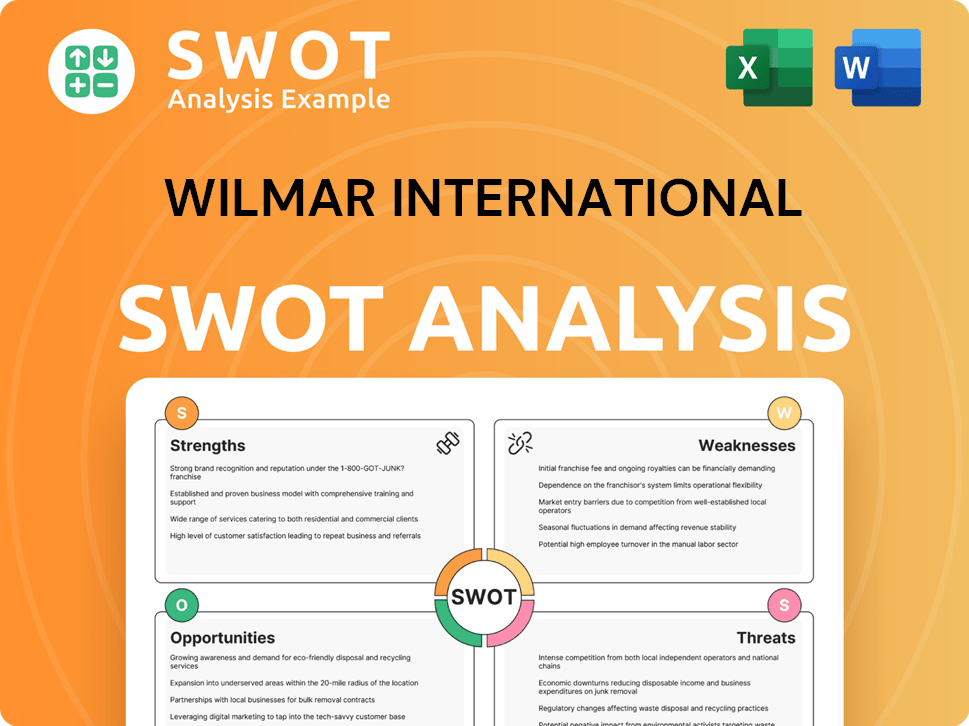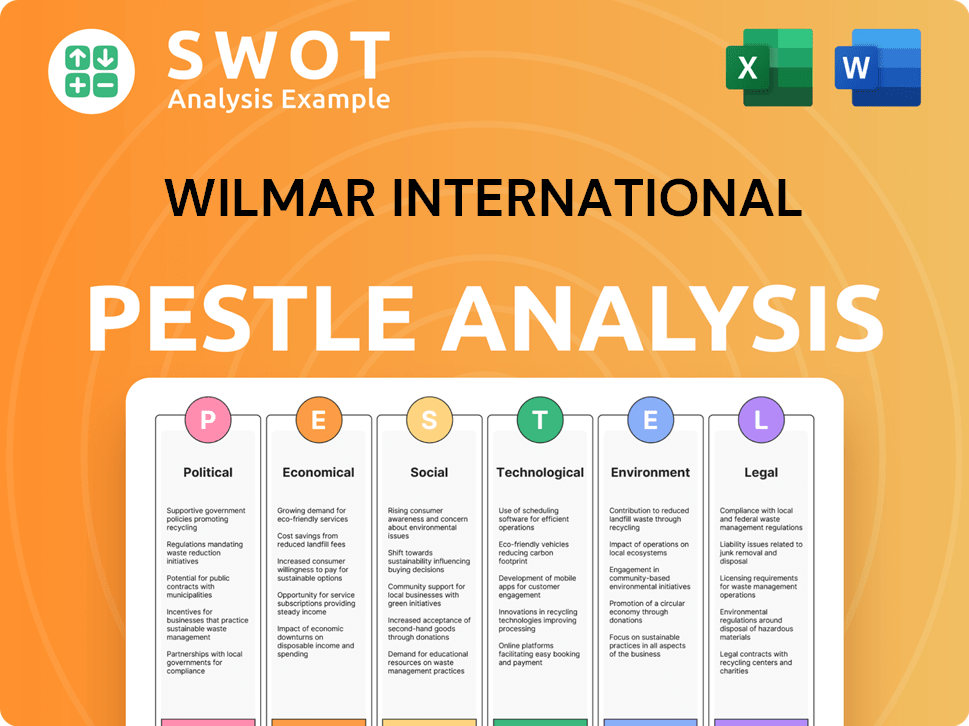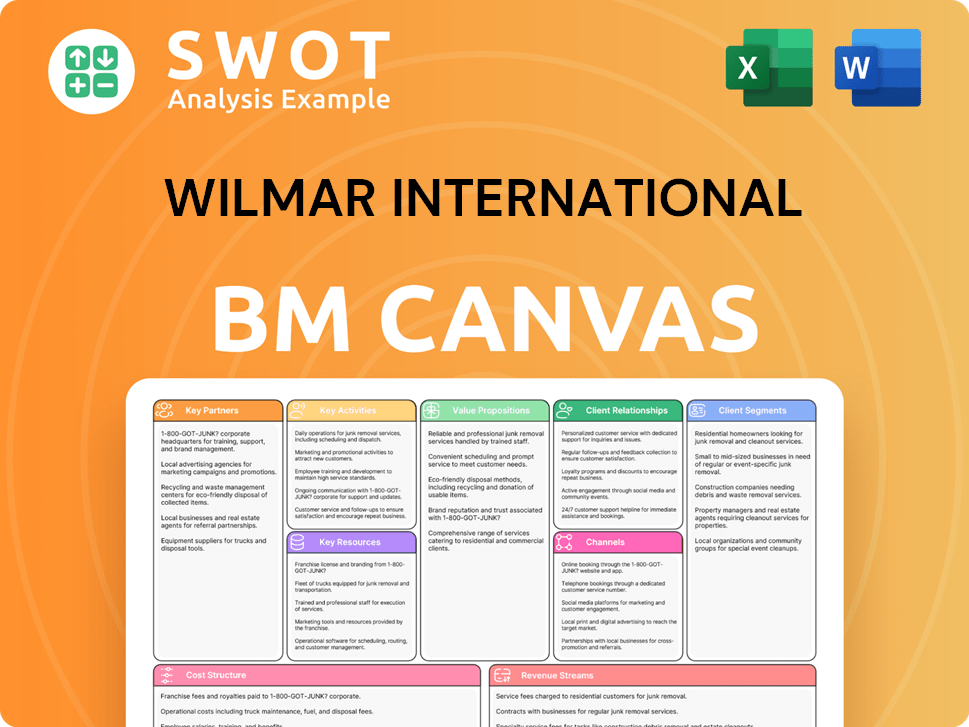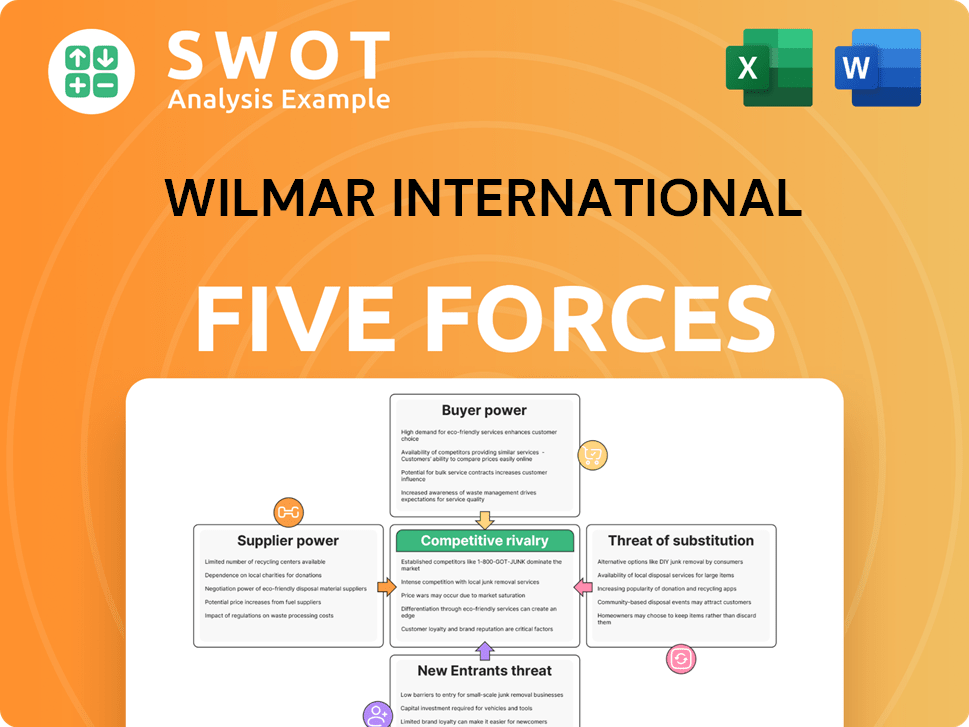Wilmar International Bundle
Who Really Controls Wilmar International?
Ever wondered who steers the ship at one of Asia's most influential agribusiness giants? Understanding Wilmar International SWOT Analysis is key to unlocking its strategic moves and future potential. This deep dive explores the intricate web of Wilmar ownership, revealing the individuals and entities that shape its destiny. From its humble beginnings to its current global dominance, the story of Wilmar is a fascinating study in corporate power and influence.

Unraveling the mysteries of Wilmar International's ownership is crucial for anyone seeking to understand the company's direction. Knowing who owns Wilmar sheds light on its commitment to sustainability and its impact on global food supply chains. This analysis will examine Wilmar's company structure, the influence of its shareholders, and the roles of key Wilmar executives, providing valuable insights for investors and stakeholders alike. We'll explore questions like: Who founded Wilmar International? and Is Wilmar International a public company?
Who Founded Wilmar International?
Wilmar International was co-founded in 1991 by Kuok Khoon Hong and Martua Sitorus. The company's inception involved a collaboration between these two prominent figures in the agribusiness sector. Their combined vision was to establish an integrated agribusiness model.
Kuok Khoon Hong, a Malaysian businessman, is the nephew of Robert Kuok, a well-known Malaysian billionaire. Martua Sitorus, an Indonesian businessman, also played a crucial role in the company's founding. The early stages of Wilmar likely benefited from the established networks and financial backing associated with its founders.
The initial strategic direction and subsequent expansion of Wilmar International clearly reflected the founding team's vision of an integrated and diversified agribusiness. The company has grown significantly since its founding, becoming a major player in the global agricultural market.
Kuok Khoon Hong and Martua Sitorus co-founded Wilmar International. They brought expertise in the agribusiness sector. Their collaboration was key to the company's initial success.
The founders aimed to create an integrated agribusiness. This model would control the entire value chain. The goal was to manage operations from cultivation to consumer products.
The company likely benefited from the founders' networks. Robert Kuok's business empire provided backing. This support helped Wilmar's early growth.
Specific equity splits at the start are not publicly detailed. There is no available information on early agreements. No records exist of initial ownership disputes or buyouts.
The founding team's vision shaped the company's strategy. This vision led to the expansion of the company. The focus was on an integrated and diversified agribusiness.
Wilmar International has grown substantially since its founding. The company has become a major player in the global agricultural market. The expansion reflects the initial strategic direction.
Understanding the founders and early ownership provides context. It helps in analyzing the long-term strategy of the Wilmar company. Knowing who owns Wilmar and the initial vision is crucial.
- Wilmar International was founded in 1991.
- Kuok Khoon Hong and Martua Sitorus were the co-founders.
- The focus was on an integrated agribusiness model.
- Early success was likely aided by the founders' networks.
- The company has since grown significantly.
Wilmar International SWOT Analysis
- Complete SWOT Breakdown
- Fully Customizable
- Editable in Excel & Word
- Professional Formatting
- Investor-Ready Format

How Has Wilmar International’s Ownership Changed Over Time?
The evolution of Wilmar International's ownership has been marked by key events since its initial public offering (IPO) on the Singapore Exchange (SGX) in 2006. The listing provided a platform for capital raising, which supported the company's expansion and strategic acquisitions. Over time, the ownership structure has seen shifts due to market dynamics, strategic investments, and the influence of major shareholders. The presence of significant institutional investors and the enduring stake held by the founding family have shaped the company's trajectory.
The company's ownership structure reflects a blend of founder influence, strategic partnerships, and public market participation. Key stakeholders, including the co-founder Kuok Khoon Hong and Archer-Daniels-Midland Company (ADM), have played pivotal roles in shaping Wilmar's strategic direction. The Kuok Group, through various entities, also maintains a considerable interest in Wilmar, reflecting the enduring influence of the founding family. These factors, combined with the presence of institutional investors, have contributed to Wilmar's ability to navigate market challenges and capitalize on growth opportunities.
| Year | Event | Impact on Ownership |
|---|---|---|
| 2006 | Initial Public Offering (IPO) on SGX | Increased public ownership; provided capital for expansion. |
| Ongoing | Strategic Investments by ADM | Maintained a significant stake, influencing strategic direction. |
| Ongoing | Market Fluctuations and Institutional Investor Activity | Influenced the percentage of shares held by institutional investors, impacting stock price and market confidence. |
As of early 2025, the major stakeholders in Wilmar International include Kuok Khoon Hong, who remains a significant shareholder, and Archer-Daniels-Midland Company (ADM). The Kuok Group, through various entities, also maintains a considerable interest in Wilmar. The company also has a broad base of institutional investors, such as mutual funds, pension funds, and asset management firms, who hold significant portions of its publicly traded shares. These shifts in major shareholding have influenced company strategy by providing capital for expansion, potentially influencing governance through shareholder engagement, and reflecting broader market confidence in Wilmar's performance and strategic direction. For more details, you can read a Brief History of Wilmar International.
Wilmar International's ownership structure is a mix of founder influence, strategic partnerships, and public market participation.
- Kuok Khoon Hong remains a significant shareholder.
- Archer-Daniels-Midland Company (ADM) holds a strategic stake.
- The Kuok Group, through various entities, maintains a considerable interest.
- Institutional investors hold a substantial portion of the shares.
Wilmar International PESTLE Analysis
- Covers All 6 PESTLE Categories
- No Research Needed – Save Hours of Work
- Built by Experts, Trusted by Consultants
- Instant Download, Ready to Use
- 100% Editable, Fully Customizable

Who Sits on Wilmar International’s Board?
The Board of Directors of Wilmar International, as of early 2025, is pivotal in the company's governance, reflecting its ownership structure. The board typically includes executive, non-executive, and independent directors. Kuok Khoon Hong, as Chairman and CEO, directly links the founding ownership to executive leadership and strategic decision-making. Other board members may represent significant shareholders or provide independent expertise. For example, representatives from major strategic investors like ADM may hold board seats, although recent annual reports should be consulted for specific current representation.
The structure of the board and its composition are crucial for understanding the dynamics of Wilmar ownership. The board's decisions and oversight directly influence the company's strategic direction and operational performance. The presence of independent directors is also important, as they provide an unbiased perspective on the company's activities. The board ensures that the company adheres to corporate governance best practices and acts in the best interests of all shareholders. The board's composition, including Wilmar executives, influences the company's strategic direction and operational performance.
| Board Member | Position | Notes |
|---|---|---|
| Kuok Khoon Hong | Chairman and CEO | Links founding ownership to leadership |
| Board Members | Various | Represent shareholders and provide expertise |
| Independent Directors | Various | Provide unbiased oversight |
The voting structure of Wilmar International generally follows a one-share-one-vote principle for its ordinary shares. There is no public information indicating the existence of dual-class shares or special voting rights that would grant outsized control to specific individuals or entities beyond their shareholding percentage. While the Kuok family and other major shareholders exert influence through their substantial holdings, decision-making typically adheres to standard corporate governance practices. To learn more about the business, you can read Revenue Streams & Business Model of Wilmar International.
The board's composition and voting structure are key to understanding Who owns Wilmar. The one-share-one-vote principle ensures fair voting rights for all shareholders. The influence of major shareholders, like the Kuok family, is significant.
- Kuok Khoon Hong as Chairman and CEO
- One-share-one-vote principle
- Influence of major shareholders
- Adherence to corporate governance
Wilmar International Business Model Canvas
- Complete 9-Block Business Model Canvas
- Effortlessly Communicate Your Business Strategy
- Investor-Ready BMC Format
- 100% Editable and Customizable
- Clear and Structured Layout

What Recent Changes Have Shaped Wilmar International’s Ownership Landscape?
Over the past few years, the ownership structure of Wilmar International has remained relatively stable. There haven't been any major shifts in the shareholder base due to significant mergers, acquisitions, or large-scale share buybacks. The company's stock continues to be actively traded, leading to minor fluctuations in the percentages held by institutional investors and individual shareholders. Key strategic investors, such as Archer Daniels Midland (ADM), maintain significant stakes, which helps to ensure stability.
Industry trends suggest a general increase in institutional ownership across large corporations, and Wilmar is no exception. A substantial portion of Wilmar's shares is held by various funds. Founder dilution has occurred over time since the company's IPO, but the founding family and strategic investors still hold considerable stakes, maintaining a degree of control. There have been no public announcements regarding planned succession or potential privatization that would immediately impact ownership. The company's focus remains on operational growth and sustainability initiatives, which indirectly influence investor confidence and ownership stability.
Wilmar International's ownership has seen minor shifts due to market dynamics. The company has not announced any major share buybacks or secondary offerings. Continuous trading of shares leads to fluctuations in institutional and individual ownership percentages.
Founder and key strategic investors like ADM continue to hold significant stakes. This ownership structure helps maintain foundational control. There are no immediate plans for succession that would impact ownership.
Wilmar International Porter's Five Forces Analysis
- Covers All 5 Competitive Forces in Detail
- Structured for Consultants, Students, and Founders
- 100% Editable in Microsoft Word & Excel
- Instant Digital Download – Use Immediately
- Compatible with Mac & PC – Fully Unlocked

Related Blogs
- What are Mission Vision & Core Values of Wilmar International Company?
- What is Competitive Landscape of Wilmar International Company?
- What is Growth Strategy and Future Prospects of Wilmar International Company?
- How Does Wilmar International Company Work?
- What is Sales and Marketing Strategy of Wilmar International Company?
- What is Brief History of Wilmar International Company?
- What is Customer Demographics and Target Market of Wilmar International Company?
Disclaimer
All information, articles, and product details provided on this website are for general informational and educational purposes only. We do not claim any ownership over, nor do we intend to infringe upon, any trademarks, copyrights, logos, brand names, or other intellectual property mentioned or depicted on this site. Such intellectual property remains the property of its respective owners, and any references here are made solely for identification or informational purposes, without implying any affiliation, endorsement, or partnership.
We make no representations or warranties, express or implied, regarding the accuracy, completeness, or suitability of any content or products presented. Nothing on this website should be construed as legal, tax, investment, financial, medical, or other professional advice. In addition, no part of this site—including articles or product references—constitutes a solicitation, recommendation, endorsement, advertisement, or offer to buy or sell any securities, franchises, or other financial instruments, particularly in jurisdictions where such activity would be unlawful.
All content is of a general nature and may not address the specific circumstances of any individual or entity. It is not a substitute for professional advice or services. Any actions you take based on the information provided here are strictly at your own risk. You accept full responsibility for any decisions or outcomes arising from your use of this website and agree to release us from any liability in connection with your use of, or reliance upon, the content or products found herein.